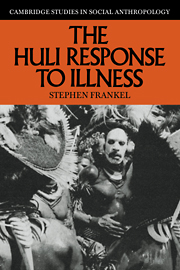Book contents
- Frontmatter
- Contents
- List of figures
- List of tables
- Glossary and note on orthography
- Preface
- 1 Introduction
- 2 Historical perspectives
- 3 Huli society
- 4 Ideas of health and illness
- 5 Morbidity, explanations and actions: quantitative perspectives
- 6 Illness attributed to proximate causes
- 7 Explanations relating to sexuality and growth
- 8 Illness grounded in social relations
- 9 Spirits and God
- 10 Patterns of response
- References
- Index
- Cambridge Studies in Social Anthropology
3 - Huli society
Published online by Cambridge University Press: 14 September 2009
- Frontmatter
- Contents
- List of figures
- List of tables
- Glossary and note on orthography
- Preface
- 1 Introduction
- 2 Historical perspectives
- 3 Huli society
- 4 Ideas of health and illness
- 5 Morbidity, explanations and actions: quantitative perspectives
- 6 Illness attributed to proximate causes
- 7 Explanations relating to sexuality and growth
- 8 Illness grounded in social relations
- 9 Spirits and God
- 10 Patterns of response
- References
- Index
- Cambridge Studies in Social Anthropology
Summary
The Huli language is classified by Wurm (1961) as a sub-family of the Enga–Huli–Pole–Wiru family of the east New Guinea Highland stock. There are some 100,000 Huli speakers inhabiting the intramontane basins and surrounding slopes of the western portion of the Southern Highlands Province of Papua New Guinea (see fig. 2). Traditionally they were not one people in any political sense. Parishes and groups of parishes were engaged in a constant round of warfare, and there were no circumstances where groupings of more than a few thousand people would unite for a common purpose. But they did have a general sense of shared identity in distinction to the surrounding cultures. The extent of Huli territory was well known, and individuals travelled widely throughout the Huli area and beyond. Most ritual was organised within a single parish but, as I have indicated, the major sacred sites were significant to many parishes, and in its ideal conception their religion aspired to the harmonious participation of all Hulis.
All Huli speakers may describe themselves as ‘Huli’ to distinguish themselves from members of the surrounding language groups. But the term Huli refers primarily to those groups living in the southern part of the Tari Basin. Huli speakers to the west of the Tagali river are referred to, and may refer to themselves, as ‘Duna’, though they speak Huli, and do not share the language or culture of the Duna people proper to the west beyond Koroba.
- Type
- Chapter
- Information
- The Huli Response to Illness , pp. 38 - 52Publisher: Cambridge University PressPrint publication year: 1986



